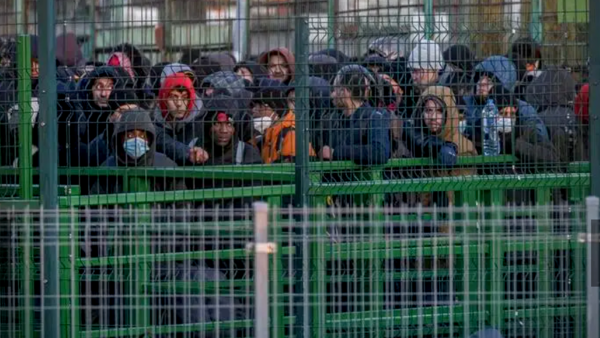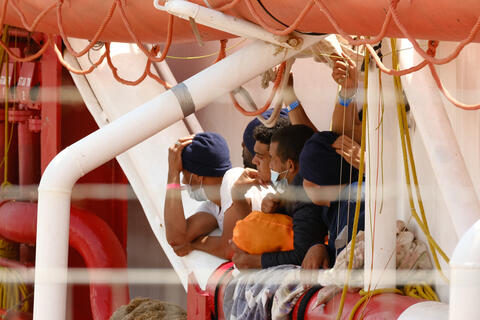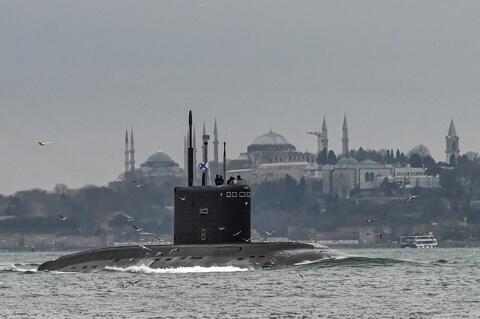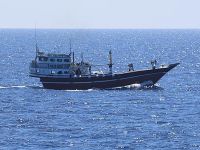Far-right politicians in France are altering their stances toward refugees following the war in Ukraine. Marine Le Pen and Eric Zemmour have both supported welcoming Ukrainians escaping the Russian invasion. But they have stopped short of widening migration beyond Ukraine.
When over a million Ukrainians left their homes to find safety in neighboring countries at the beginning of Russia’s invasion, people from Africa, Asia, and the Middle East were obstructed from crossing the border. Many were forced to wait for days in freezing conditions whilst Ukrainian nationals were allowed into Poland, Romania, Slovakia, Hungary, and Moldova with relative ease.
Gifty Naana Mensah, a medical student from Ghana, told the Globe and Mail she spent two days at the Polish border while Ukrainians crossed first. “[The] Ukrainians always came first, even though we Africans would be there for days and sometimes three days with no food. Everyone was just exhausted. Any time Ukrainians came, they told us to go back. They were shouting at us, ‘go back.’ It was really crazy,” she told the newspaper.
Initially, the reports of people being pushed to the back of transport queues, forcibly taken off buses, and delayed at the border were dismissed as Russian propaganda. However, the UN later confirmed the claims.
Sympathy for refugees in Europe has been fractured for a long time. Anti-immigration rhetoric typically targets migrants from the Middle East and Africa. Marine Le Pen and Eric Zemmour, the two lead right-wing candidates in France’s upcoming April presidential election, have galvanized support through anti-immigrant sentiment, particularly since the Syrian war led to many refugees seeking shelter in Europe.
However, public outcry over Vladimir Putin’s invasion of Ukraine has caused their polling figures to fall dramatically. One poll suggests 80% of the French public think Ukrainian refugees should be welcomed.
The French-right are seen to be heavily implicated in Putin’s foreign affairs. Before the invasion, Le Pen and Zemmour had held Putin up as a model leader, not dissimilar to Donald Trump’s ongoing vocal support for the Russian president. But shock at Russia’s invasion shifted sentiment in France towards sympathy for Ukrainians forced to flee the violence.
Shortly after the invasion, Marine Le Pen, who is leader of the Rassemblement national party which has long-standing ties with Putin, was left in a public relations nightmare after her campaign distributed over 1.2 million pamphlets that included a photograph of Le Pen shaking hands with Putin. Some of the pamphlets were destroyed but it can still be viewed on Le Pen’s website.
Le Pen has said that France should welcome refugees from Ukraine because they are European, which she suggests leads to a “natural solidarity” between the French and Ukrainians. Zemmour has touted a similar line, though he’s argued that only Ukrainians with ties to France should be allowed to settle in the country.
"If they have ties to France, if they have family in France...let's give them visas," Zemmour said earlier this month. He said the reason France cannot accept refugees who are not “European” was a “question of assimilation.”
“There are people who are like us and people who are unlike us. Everybody now understands that Arab or Muslim immigrants are too unlike us and that it is harder and harder to integrate them,” he said.
Le Pen has questioned whether those leaving Syria are genuinely refugees from conflict. Claiming that most Syrian refugees are men, Le Pen suggests they are migrating for work rather than to seek safety. However, the data from the French ministry in charge of administering asylum claims shows that 40% of claimants were women. Furthermore, over 90% of those seeking asylum live with their families.
It is not necessary to look at far-right rhetoric to see anti-immigrant policies in Europe, however. The European Union says that anyone seeking to leave Ukraine can enter the EU regardless of nationality. But the disparities in the application process between a refugee from Ukraine and refugees from other conflict zones makes both cases incomparable.
Ukrainian refugees have been granted a speeded-up process to apply for asylum, are given one year work permits, social welfare, and accommodation benefits. People fleeing conflicts in Syria, Afghanistan, Iraq, and Africa, however, face a longer application process, temporary shelter, and a nine month work permit following an application. Even before they begin their application, refugees need to safely reach Europe despite Frontex’s aggressive push-backs in the Mediterranean Sea.
Within France, there are voices questioning the bias towards Ukranians fleeing conflict. Francois Guennoc, who works for an organization assisting migrants along the French coastline, says the new-found sympathies for refugees should extend beyond those coming from Europe. "A refugee is a refugee. There should be no discrimination," he told AFP.
"It is great to see all this being put in place. But we would like everyone fleeing war to be treated like this. If the British authorities open an office in Calais, why should it be reserved for Ukrainians?” Guennoc said.
The first round of the French presidential elections are on 10 April. The war in Ukraine has already had a big impact on who remains in the running. Some polls suggest Eric Zemmour may have dropped out of the top three candidates. A drop in anti-immigrant sentiment should be welcomed. But for whom this new open spirit extends is still to be seen.











